|
Music Reviews
Alternative
Blues
Books
Christmas
Classic Rock
Country
Jazz
Lounge
Oldies
Power Pop
Punk & New Wave
Reggae
Rhythm & Blues
Seventies
Texas
Special Features
Randy's Rodeo
Sex Pistols
Motown
Halloween
Valentine's Day
Information
About Me
Feedback
Links
User's Guide
Support Me
Amazon
iTunes
Sheet Music Plus
|
Support Randy's Rodeo!  Shop at Amazon
for books and more...
Shop at Amazon
for books and more...
 Of
all the authors discussed herein, Greil
Marcus is the one I can say, unequivocally, is smarter than I am. No contest. All of
them are better writers, and most are better educated, but Marcus towers above us all like
a hepcat colossus. Usually, even hyper-astute Robert Christgau is
merely articulating things I've already intuited - and articulating them very well.
But, comparing my work to Greil Marcus' would be like comparing Donovan to Bob Dylan - get
real! Of
all the authors discussed herein, Greil
Marcus is the one I can say, unequivocally, is smarter than I am. No contest. All of
them are better writers, and most are better educated, but Marcus towers above us all like
a hepcat colossus. Usually, even hyper-astute Robert Christgau is
merely articulating things I've already intuited - and articulating them very well.
But, comparing my work to Greil Marcus' would be like comparing Donovan to Bob Dylan - get
real!
In many ways, Marcus set the bar for rock criticism with his 1975 opus, Mystery
Train, and has continually raised it with each new book. The fact of the matter
is, Marcus rarely discusses simply rock and roll. Instead, he ranges far and wide across
the cultural landscape using rock and roll as a touchstone, a looking glass, or, at least,
a familiar talisman. The results are can be dazzling or confusing (like I said, he's smarter
than I am) or both; consistently, his keen knowledge and intuitive understanding of the
music burn through his dense prose like a fuse, leading invariably to his unassailable,
passionate, rock and roll heart.
Greil Marcus was born in 1945, grew up in San Francisco, and studied political science at
Berkeley. Like many of his peers in the early rock press, he made a name for himself first
at Creem, then at Rolling Stone (where he remains a contributing editor
to this day). In a profession not renowned for its intellectual rigor, Marcus had begun to
attract attention as a deep thinker with an innate sense of rock's animal essence. His reputation
was sealed with the publication of Mystery
Train - a remarkable book that connected the dots between rock and roll and culture-at-large,
revealing what Marcus called "unities in the American imagination."
From there, Marcus began to cast his net even wider, examining the entire scope of Western
civilization, often passing through narrow portals to do so. Marcus' typical methodology
involves intense focus on a particular cynosure - objects as particular as one band (the
Sex Pistols in Lipstick
Traces), one man (Elvis Presley in Dead
Elvis), or one album (Bob Dylan's Basement
Tapes in The
Old, Weird America). From there, he springboards to discussions of, well, whatever strikes
his (duly considered) fancy. As Marcus once said, "The whole point is where it can take
you, not whether you can stick to the subject."
Greil Marcus has also written about film and politics, and he compiled and edited Rock
And Roll Will Stand (out-of-print, 1969) and Lester Bangs' Psychotic
Reactions And Carburetor Dung (1988). He remains a vital, active journalist (for Interview, Esquire,
the New York Times, and others) searching for artists who, as he puts it, know
things he doesn't. His recent enthusiasms include Sleater Kinney and Pink (!), and he still
writes his long standing, traveling column, Real Life Rock Top 10 (currently residing
at Salon.com).
Interviews with Marcus, reviews of his books, and random archival writings are abundantly
scattered across the web. Among the highlights:
In 2006, Marcus published yet another erudite, synergistic piece of connect-the-dots history
entitled
The
Shape of Things to Come: Prophecy and the American Voice, following a meandering route
from Abraham Lincoln to Pere Ubu. In 2008, he contributed text to Pop Art Is, an art book about the impact of Richard Hamilton's 1957 letter on the subject.
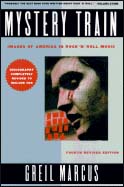 Mystery
Train: Images of America in Rock 'N' Roll by Greil Marcus Mystery
Train: Images of America in Rock 'N' Roll by Greil Marcus
by Greil
Marcus (1975, fifth edition, 2008)
Greil Marcus didn't write the first serious book about rock 'n' roll - Nik
Cohn, Robert
Christgau, and others can make that claim - but he wrote the one that grabbed the Fourth Estate by
its flabby little throat. Mystery
Train announced the arrival of a new breed of writers - thinking men and women who considered rock
music a significant product of American culture - with Marcus at the vanguard. From the very start of
his career, Marcus was enthralled with connections between seemingly disparate cultural phenomena (Herman
Melville and Elvis Presley, for instance, to use Marcus' own example), and he makes a case here for rock
'n' roll as one thread in the rich tapestry of America's cultural legacy. By Pprofiling a handful of
artists - including The Band,
Sly Stone, Randy Newman, and Elvis Presley - Marcus paints a much more vivid picture of rock's significance
and place in American history than encyclopedic tomes like Rolling
Stones' Illustrated History Of Rock & Roll. Consequently, critiques
of Mystery
Train consistently place it at the top of the stack in rock literature, and it is inarguably a book
all students of the form should closely read. [top of page]
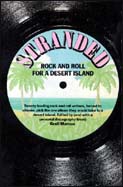 Stranded:
Rock And Roll for a Desert Island Stranded:
Rock And Roll for a Desert Island
edited by Greil
Marcus (1979)
We record collectors are just specialized nerds, hopeless dweebs caught in an evolutionary niche that
focuses our maniacal devotion on one solitary achievement in Western civilization. A common pastime
of record collectors (not to mention book worms and film buffs) is which our favorites we would choose
if stranded on a desert island. Obviously, this argument begs the question of where the electricity
would come from to actually run our phonograph (not to mention why we were schlepping such precious
cargo around the high seas), but it's a form of mental masturbation we particularly relish. Greil Marcus
(and twenty of his peers in the rock press) formalized this activity in Stranded,
in the process creating a book about rock records more enjoyable and informative than most scholarly
tomes on the same subject. Beginning with Nik Cohn's typically careening introduction, Stranded touches
an impressively varied list of records (classics all, though none were recorded by Elvis, the Beatles,
or Bob Dylan) including Dave Marsh's fictional "Onan's Greatest
Hits" - after all, there'll
be a lot of time to kill while stranded.... Marcus concludes with an abundant "treasure island" discography,
violating his own premise to the benefit of his readers. [top of page]
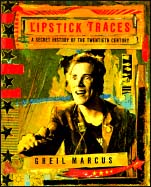 Lipstick
Traces: A Secret History Of The 20th Century Lipstick
Traces: A Secret History Of The 20th Century
by Greil
Marcus (1989)
The Sex Pistols, the Mekons, the Slits - punk rock seemed to come spitting out of England with complete
disregard for history and convention. Greil Marcus was as enthused by the music as anyone, but, in Lipstick
Traces, he discerns the lineage of thought that gave rise to the punks - Dadaism, Surrealism, the
Situationists, and others who attempted to turn society on its head. The author's tendency to play
connect the-dots with history is readily apparent, and his methodology begins to strain the limits
of believability.
For instance, the Sex Pistols' Johnny Rotten is linked to Anabaptist John Of Leydon on scarcely more
than the similarity of his real name (John Lydon). Bluntly stated, my understanding of Marcus' theory
is limited by my education (more "Louie Louie" than deductive logic), but his enthusiasm
and honesty shine through the dense arguments. In his epilogue, Marcus argues that the glory of the
moment
that could change the world is inseparable from the tragedy of the moment after - when the world has
not changed. Nothing describes British punk more poignantly succinctly. [top of page]
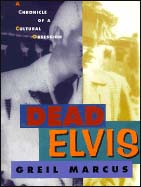 Dead
Elvis: A Chronicle of a Cultural Obsession Dead
Elvis: A Chronicle of a Cultural Obsession
by Greil
Marcus (1991)
Greil Marcus first examined Elvis Presley in some detail in his groundbreaking 1975 book Mystery
Train. Already, then, he viewed Elvis more as a symbol than a rock star. Elvis died just two short
years after the publication of that book, and Marcus' Dead
Elvis documents Elvis' subsequent transformation from fleshly being to cultural icon. In classic
Hollywood fashion, Elvis became worth more in death than life; we slaver for boxed sets, books, posters,
shot glasses, commemorative coins, and other paraphernalia in a manner unthinkable during the dark days
of the King's decline. Clearly, the idea of Elvis is more resonant to us than his music ever was. How
else to explain the mysterious Elvis sightings, the conspiracy theories, the annual pilgrimages to Memphis?
With this book (which should have closed - but did not - the debate about Presley), Marcus documents
the canonization of Elvis Presley and analyzes what the phenomenon tells us about ourselves. [top of page]
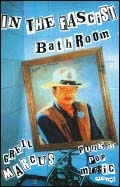 In
the Fascist Bathroom: Punk in Pop Music 1977-1992 In
the Fascist Bathroom: Punk in Pop Music 1977-1992
by Greil
Marcus (1993, revised 1999)
Greil Marcus appears to have been a critic from the word 'go'. Confronted
with rock 'n' roll in 1955 (specifically, Bill Haley's "Rock around
The Clock"),
he disliked it. He's been disagreeable ever since, and his affinity for the
contrary drew him to punk rock like a moth to flame. Much of his
writing about punk (well, the British version of it) is collected in the present volume, and it vividly
demonstrates that there was, in fact, life after Sid Vicious. Originally published in a variety of
periodicals, this is Marcus reacting to records and performances in the here-and-now,
sans post-game-wrap-up philosophical
dissection. For those who have read only Marcus' lengthy, studious books, the effect is bracing; this
is a guy who cares about music with great passion, and this is a writer of great humor and accessibility.
The 70-plus pieces included survey such punk stalwarts as Elvis Costello, the Clash, the Mekons, and
the Gang Of Four (originally titled Ranters
and Crowd Pleasers). [top of page]
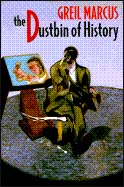 The
Dustbin Of History The
Dustbin Of History
by Greil
Marcus (1995)
An anthology of previously published pieces addressing everything from the Beat Generation to The
Manchurian Candidate to the Tiananmen Square massacre to Camille Paglia, The
Dustbin Of History is pure Greil Marcus. That is, Hammer
Of The Gods, it is not. Unlike his earlier Lipstick
Traces, Marcus resists the urge to tie everything imaginable into a unified theory, but he comes
pretty damn close with this central theme: history isn't in the past. History doesn't merely happen
and get discarded (relegated to "the dustbin"). It is occurring and reoccurring right now
and is being incorporated into our present and future; recognition of this fact will can only enrich
our experience.
Marcus examines (and corrects) history though his subjects, and such examinations are a path to a better
tomorrow. That the subjects can be as varied as the music of Robert Johnson or the acting of John Wayne
is another of Marcus' many lessons. [top of page]
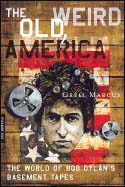 Old,
Weird America: The World of Bob Dylan's Basement Tapes Old,
Weird America: The World of Bob Dylan's Basement Tapes
by Greil
Marcus (1997)
A virtual accident of a book, The
Old, Weird America is not really about Bob Dylan's Basement
Tapes. That album was recorded by Dylan and The Band while holed up in Woodstock, New York, following
the singer's near-fatal motorcycle accident. Thirty years later, Marcus found himself at loose ends between
books while listening to Dylan's work with renewed vigor. With Good
As I Been to You (1992) and World
Gone Wrong (1993), Dylan had gotten back-to-basics after some ill-advised digressions in the
80's. (These albums set the stage for a string of brilliant albums beginning with Time
Out Of Mind in 1997.) Meanwhile, Marcus had picked up a 5-disc Basement
Tapes bootleg and began to wonder about the story therein - not about the music per se but
about the cultural spirits it channeled. Marcus heard not Bob Dylan or Levon Helm but Doc Boggs and Blind
Lemon Jefferson and the deepest yearnings of a decidedly different America, one that is rarely portrayed
in the mainstream media. It's an America that exists largely in our imaginations (hence, the book's original
title, Invisible
Republic), but it's certainly as real - perhaps more real - than Ronald Reagan and Disneyland.
As a sequel of sorts, Marcus scripted an entire book (albeit a short one) about
just one Dylan song. Like
A Rolling Stone: Bob Dylan At The Crossroads (2001) functions as a defense
of the song as masterpiece, a minutely detailed history, and as an analysis of
Dylan's place in American history. "How does it feel?" indeed. [top of page]
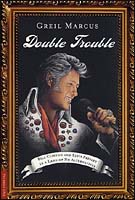 Double
Trouble: Bill Clinton and Elvis Presley in a Land of No Alternatives Double
Trouble: Bill Clinton and Elvis Presley in a Land of No Alternatives
by Greil
Marcus (2001)
In his most recent anthology, Greil Marcus once again takes on the true nature of America through ostensibly
unrelated cultural phenomena - Bill Clinton and Elvis Presley. Clinton, after all, had barely begun his
public life when Presley expired ignominiously on his bathroom floor. Like most of Marcus' metaphors,
though, I don't believe he gives a rat's ass about whether he can actually prove his hypothesis.
The point is the discussion, the dizzying whirlwind of ideas that Marcus loves to conjure. The author
asserts that Elvis The Pelvis and Slick Willie both represent America's "unresolved notion of what
it means to be good, true, and beautiful - and evil, false, and ugly." The evidence Marcus exhibits
(e.g. a commemorative Elvis postage stamp was issued concurrent with Clinton's 1992 election) is often
as ridiculous as his argument is compelling. But, that's just the title piece! Marcus proceeds to take
on the wider implications of P.J. Harvey, Kurt Cobain, and Pere Ubu, proving another of his basic assumptions
(here and elsewhere): once you see rock 'n' roll as something separate from history, you lose all understanding
of what rock 'n' roll is or ever was. [top of page]
|
|